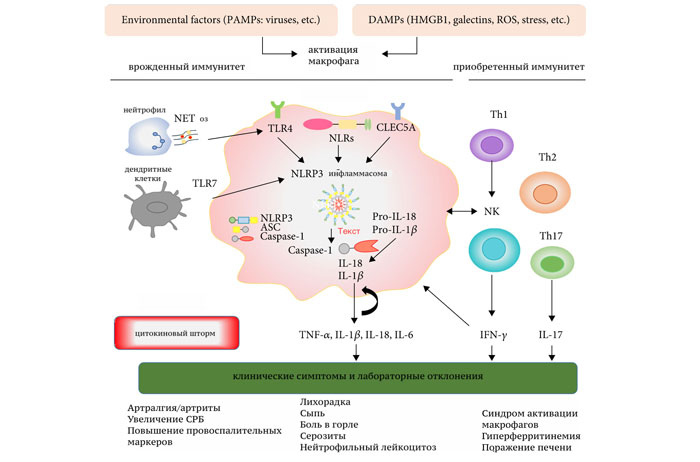
A new treatment regimen for Still's disease
A crucial area of the WCRC for Personalized Medicine is the study of unknown, rare and genetically determined diseases. One of such disorders is Still's disease.
Adult-onset Still's disease (AOSD) is a rare systemic inflammatory disorder with an estimated prevalence of one to 24 cases per million people. It has two age-related peaks: the first peak — young age (15–25 years), the second — in persons aged 36–46 years. The current perception of AOSD tends to consider this disease as an autoinflammatory disorder with the involvement of NLRP3 inflammasome playing a key role in the pathogenesis as the main source of the synthesis of certain cytokines, specifically IL-1, IL-18. In world practice, there are no generally accepted recommendations for AOSD. Treatment approaches are based on the use of anti-inflammatory drugs. Non-steroidal anti-inflammatory drugs (NSAIDs) are used as first line treatment and are effective only in 20% of patients, which inevitably leads to the second-line therapy with medium and high dosages of corticosteroids associated with a large number of adverse events. Methotrexate is currently used only as a steroid-sparing drug. A promising option is anti-cytokine therapy, however, clinical trials have been completed and only one drug, canakinumab, an IL-1β inhibitor, has been registered.
Colchicine is the gold standard for the treatment of recurrent pericarditis according to the European Society of Cardiology guidelines. It is known that pericarditis is one of the common cardiac manifestations of AOSD in more than 30% of patients, which often leads to the administration of colchicine.
The specialists of the WCRC for Personalized Medicine, Research Laboratory of Autoimmune and Autoinflammatory Diseases have developed and tested a novel treatment regimen for adult Still's disease.
Rheumatologist V. Yu. Myachikova under the guidance of A. L. Maslyansky and O. M. Moiseeva conducted a study to analyze the use of colchicine in patients with a systemic form of AOSD who received combination therapy with ibuprofen (in most cases, ibuprofen 600–800 mg 3 times a day) and colchicine (1 mg per day) to control pericarditis. It was found that in 16 (80%) of 20 patients the combination therapy was able to control not only the symptoms of pericarditis, but also systemic manifestations. Remission was achieved in 13 patients (65%).
The obtained data allowed the researchers of the Research Laboratory of Autoimmune and Autoinflammatory Diseases to develop and test a new treatment regimen for adult Still's disease.
The results obtained together with the low cost, safety and wide availability of the proposed therapy regimen lead to the conclusion that this approach can be considered as promising.
To learn more about the results of the study, follow this link https://www.clinexprheumatol.org/abstract.asp?a=17765.
25.05.2022
